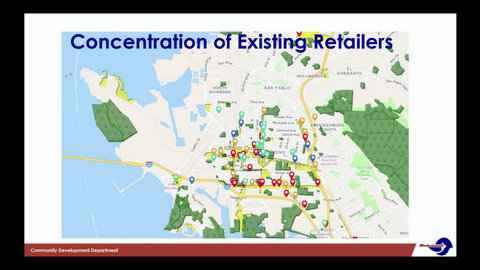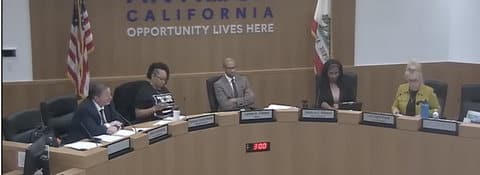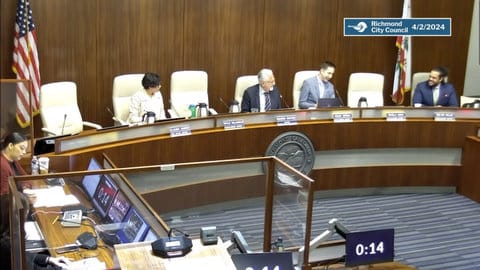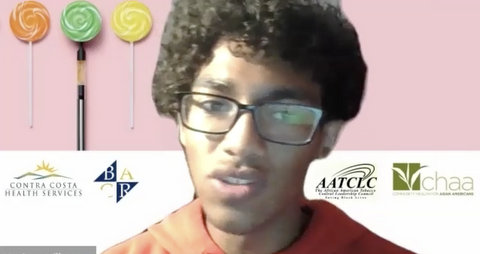
02 Apr Richmond Extends Moratorium on Smoke Shop Licenses, Permits

A map showing the distribution of Richmond’s tobacco retailers, which one public commenter said were mostly “in the flatlands, as noted by city staff, especially the Iron Triangle and along the 23rd Street Corridor.” (Screenshot captured by Samantha Kennedy / The CC Pulse)
By Samantha Kennedy
Faced with an increasing number of problems at smoke shops, among them underage employees and the marketing of drugs to minors, the Richmond City Council on Tuesday extended a ban on new shops until next year.
The ban continues the pause on issuing new permits or licenses to the dozens of tobacco retailers operating in the city, except for a handful of previously compliant shops.
The extension, which started as a 45-day moratorium last year to address community concerns about crime and youth health, comes as city staff said inspections found issues were “much broader and more serious than initially believed.”
“We’ve found that retailers are selling unlawful cannabis, psychedelic mushrooms, drug paraphernalia,” said Lina Velasco, director of community development. “Some of this material we’ve found held in concealed, hidden drawers.”
Velasco said she doesn’t expect the moratorium to last another year, and new regulations could come as soon as this summer.
Inspections found that 52 of the 83 tobacco retailers known within the city are operating without a license, according to staff. Some retailers have also been found to employ underage employees; sell or market unlawful cannabis, illicit drugs and paraphernalia to customers, including minors; and have shelves filled with “mass quantities” of flavored tobacco products.
The city defines a tobacco retailer as any shop that sells tobacco, including dedicated smoke shops and convenience stores that also sell food.
Two retailers asked council members to not go forward with the ban, saying it has hurt them financially.
“This moratorium, if it gets extended, we’ve already been told by our company that we will lose our franchisee and will have to go somewhere else,” one retailer said, who noted their two shops were always in compliance with licensing requirements. “We cannot survive here in Richmond any longer, whether we want to or not.”
Residents Ahmad Anderson and Oscar Garcia said the smoke shops attract crime and disproportionately impact young people of color.
“Most are in the flatlands, as noted by city staff, especially the Iron Triangle and along the 23rd Street Corridor. This means our Black and Brown youth are most impacted by these smoke shops,” said Garcia. “The city still has not inspected all of the smoke shops because there’s so many — what else will they find when they continue these inspections?”
>>>From Our Archives:
Curbing Youth Tobacco Sales a Social Justice Issue, Advocates Say<<<
Council members Doria Robinson and Vice Mayor Cesar Zepeda supported extending the ban but raised concerns about how previously compliant shops might be impacted.
“I would love a little more definition in there (differentiating retailers) so that we can figure out how to not persecute the businesses that have been with us a long time,” said Zepeda. “The intent of this moratorium was targeted at the smoke shops because they’re the ones that sell the illicit drugs.”
Robinson proposed shops that had previously been compliant with regulations — meaning the shop at some point had a tobacco license and a business license — should be exempt from the ban to allow them to renew their license.
Around a dozen of the known tobacco retailers have held a tobacco license at some point since the city passed the regulations in 2018, according to Velasco, but it’s unclear if any of those retailers were also engaged in illegal activities. In that event, Robinson said they should not be eligible for an exemption.
Other guidelines also come into play for retailers, said Velasco.
Current regulations require that retailers not be located within 1,000 feet of youth-populated areas like parks and schools and 500 feet of other tobacco retailers.
“The council is going to have bigger challenges,” said Velasco. “If we don’t put a cap or some density (requirements for retailers), that means we’re going to have one tobacco retailer for every 1,300 residents in Richmond, which is probably too many if we’re trying to limit the health impacts of that product.”
Richmond amended its ordinance in 2019 to include a ban on electronic cigarettes and vaping products. State law also bans flavored tobacco products since going into effect in 2023.
Council members passed the moratorium extension in a 5-0 vote, with council members Soheila Bana and Claudia Jimenez absent.






No Comments